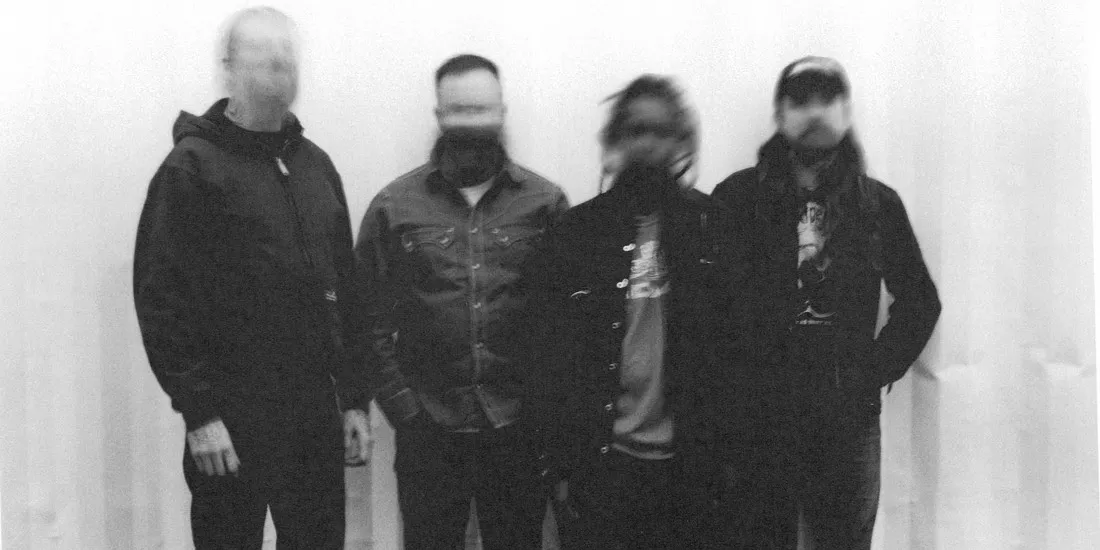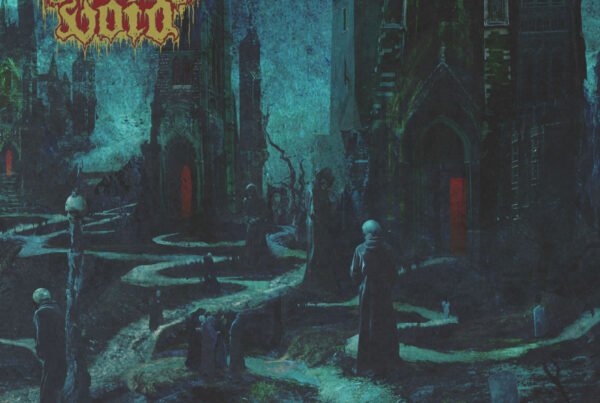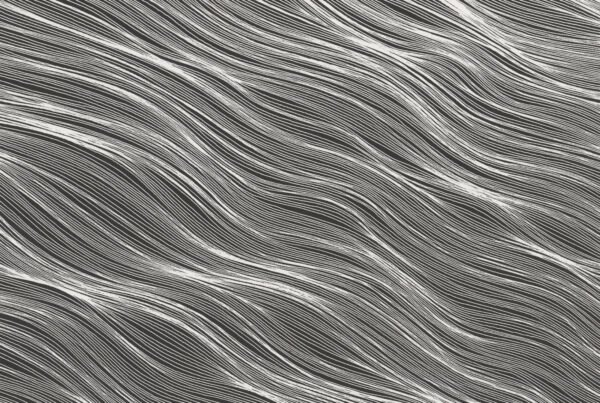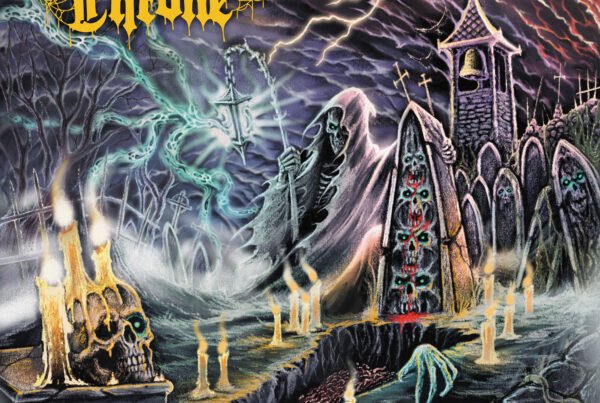Experimental metal titans SUMAC team up with poet/musician/activist Moor Mother to create a caustic, revolutionary soundtrack on The Film.
Release date: April 25, 2025 | Thrill Jockey | SUMAC | Facebook | Instagram | Bandcamp | Moor Mother | Facebook | Instagram | Bandcamp | Website
There is a shared language in art, whether the written or spoken word, music, sculpture, paintings or film, that is often able to transcend language barriers. This language, expressed in many forms and expressing many emotions and facets of humanity can whisper as much as it can violently erupt. However it hits you, experiencing some new revelation or new perspective on a familiar emotion is one of life’s most satisfying experiences. Since life is ultimately a collection of experiences tied together by consciousness and time, I think we are better off for experiencing as many things as our minds allow. If you share that sentiment and sense of artistic wanderlust, then you will inevitably find the more experimental side of art. Areas where the synthesis of mediums shift the approach to creation and the consumption of art.
So, today’s subject is one of abstraction, synthesis, and unconventional approach. Were I a better writer, or perhaps the conventions of an album review more open to obfuscation, maybe I could convey this assessment of another’s art in a way that shifts paradigms, as well. Instead, I will employ my words as best I can to describe an album that is nearly indescribable, certainly the most unique album I have heard this year. And this should be no surprise coming from SUMAC and Moor Mother, two of the most unique and unconventional artists in their respective genres. SUMAC, the powerhouse trio of Aaron Turner, Brain Cook, and Nick Yacyshyn who use heavy metal like Ornette Coleman used jazz, free form and impressionistic, and Moor Mother, who has deconstructed hip-hop, jazz, poetry, punk, and music in ways that are singular in their manifestations, like David Lynch or Andrei Tarkovsky, seem like a perfect match for experimental collaboration.
This isn’t the first time either artist has collaborated with others, SUMAC with Keiji Haino and Moor Mother with a bevy of cross-genre creatives, nor is this the first time metal and hip-hop have merged. It is, however, unlike any of those things. their collaborative full-length The Film is approached like a film score, kind of, a narrative, kind of, but through the experimentation and heavy conceptual premise, an album emerges that somehow feels like the logical conclusion to this collaboration. Moor Mother‘s poetics and vocals taking their confident place in the foreground and acting as a guidepost for SUMAC, while their discordant drones, doom, and post-metal enunciate their emotional heft as contemplations and punctuation, page breaks and space manipulation in Moor Mother‘s chapbook.
The poetics of The Film are gripping from the start, pitch shifted down with the lyrics, ‘All they know is hate/hate ’til they OD/ and all they do is kill/ they don’t want us to breathe,’ as Turner’s guitar menacing lurks in the background. As the vocals return to a less processed poem that addresses the way oppressive systems have stripped victims of belief in the narratives the powerful use to absolve themselves of accountability. Moor Mother’s use of language and delivery calls to mind a section from Ta-Nehisi Coates’s book The Message, where he discusses his love of language, words, their roundness in your mouth as you say them, their power to convey complex messages with striking efficiency. He cites Rakim as part of this realization, and Moor Mother is very much a part of that canon of writers and speakers who make each syllable feel like the heavy booted footsteps of truth marching from her diaphragm into our awareness.
She employs repetition to great effect, often letting each repeated phrase intensify its own gravity. “Scene 2: The Run” sees SUMAC mirroring this as Brian Cook’s bass slowly repeats a downturned note like an ominous horror film soundtrack. The horror lies in ‘blood thirst realties,‘ and, ‘shadows of uncertainty.‘ The theme of running, the refrain of, ‘I was running,‘ gets repeated throughout the album. Turner and Yacyshyn keep the music liquid, dancing between chords and beats the way Moor Mother free associates destructive terror. About eight and a half minutes into the song, a shift happens and we hear the band move from textural painting into a more traditional post-metal passage. Turner executes his only vocal passage, and for a while, we feel the familiar influence of Turner’s legendary ISIS. For an almost 13 minute track, the progression and intensity make it seem much shorter.
“Hard Truth” throws another new texture into the mix, a noise interlude overlayed with gorgeously empyrean vocals from Kyle Kid. This serves as an appetizer to “Scene 4” which features vocals from Sovie. ‘Scene 3,” however, feels like the most traditionally structured track on the album, utilizing a sludgey-grunge-tinged chord progression. There are still no choruses, no cutesy hooks or TikTok clips to be had, but this is both expected and purposeful as the lyrics tackle hustle culture, consumerism, surviving in post-capitalism, and the ever-present threat of state violence. ‘They dropped an atomic bomb on our memories/we don’t remember what it means to ever be free/whip and nay nay ourselves away from our dreams,‘ Moor Mother sings, as we look for reasons to convince ourselves that it all makes sense, deconstructing “C.R.E.A.M.” by Wu Tang Clan and Get Rich Or Die Tryin‘ by 50 Cent at the same time.
Nick Yacyshyn, already one of the best drummers in heavy music, also adds synthesizers to the evolving textures of The Film. “Scene 4” is one of many examples of this as percolating synths welcome Sovie and the introduction of another profound theme of the album. ‘Nobody told me,’ repeats MM, setting up one of the less spoken about effects of colonialism and racism. That through the dominating narratives and culture of white supremacy, we are not taught how to love. The very compassion that we require to function as communities or as a society isn’t taught by any institutions, and the erasure of others, neighbors, strangers, people who don’t fit into the dominant paradigm is taught alongside any efforts to teach love, through cultural absorption rather than direct lessons from authority, barring a love patriarchal and monogamous that seeks to subjugate as much as it seeks to idealize a specific kind of romance and compassion, transactional and hierarchical . ‘Nobody told me how love was supposed to be, how peace was supposed to be,‘ the lyrics conclude, resonating amongst the grim textures from the band. Perhaps this is the central theme to take away from The Film, though many criticisms of Western hegemony are at play.
SUMAC‘s last three albums were titled Love In Shadow, You May Be Held, and The Healer chronologically. So, this isn’t new territory for SUMAC, as they have always used their immensely heavy sounds as a bludgeon against the corrupting forces of power. “Camera” expresses this through a series of samples that serve as critiques of technology and the measures of ‘advancement’ that colonial societies employ to justify their reigns of terror. Moor Mother repeats, ‘get away,’ throughout the free form maelstrom of drums and guitars, painting the camera itself as the gaze of capitalism, forever seeking to turn each documented image into another advertisement for commodities and services and justification for how this way of life is unquestioningly superior. ‘Don’t expect me to be amused,‘ one sample says clearly, ‘there’s nothing funny about the tools of capitalism,‘ before Moor Mother‘s pitch-shifted vocals return to describe ‘the light‘ and what can be seen by the camera as a way to give visibility to the suffering and death inflicted by the powerful antagonist.
Another synth lead interlude, “The Truth Is Out There,” prepares us for the final scene, calling to mind John Carpenter and ’80s science fiction. “Scene 5: Breathing Fire” is a nearly 17-minute epic that serves as the climax and coda to the narrative. Throughout the song, the narrator/Moor Mother finds new resolve and confidence referencing the need to sort through the noise and stand resolute against tyranny, referencing Rancid and Operation Ivy juxtaposed to more post-metal that is reminiscent of ISIS. ‘Take warning, take caution/take off running, there’s a freeze up coming,‘ she sings over the most melodic riffs on the album, tying earlier themes back together. Naturally, the song deconstructs itself into Mars Volta-esque calamity before more meditative sounds take over as the lyrics take us away from Earth itself in a final escape.
The Film is nothing short of an incredible journey. SUMAC‘s tendencies to veer into left field sonics are at once harnessed into focus and allowed to flourish in support of Moor Mother‘s poetic vocals. Conversely, Moor Mother has the jazziest of experimental metal bands to add chasms of emotional depth to those lyrics with more distortion than Irreversible Entanglements or 700 Bliss or her solo work. This balancing act of two powerful artists amplifies the voices of each and has made the some of the most compelling music of either of their careers, so far. I have lost count how many times I have listened to this album, because each time is so absorbing that it feels new again. While both SUMAC and Moor Mother are regulars on my personal albums of the year lists, The Film outranks all of them.






